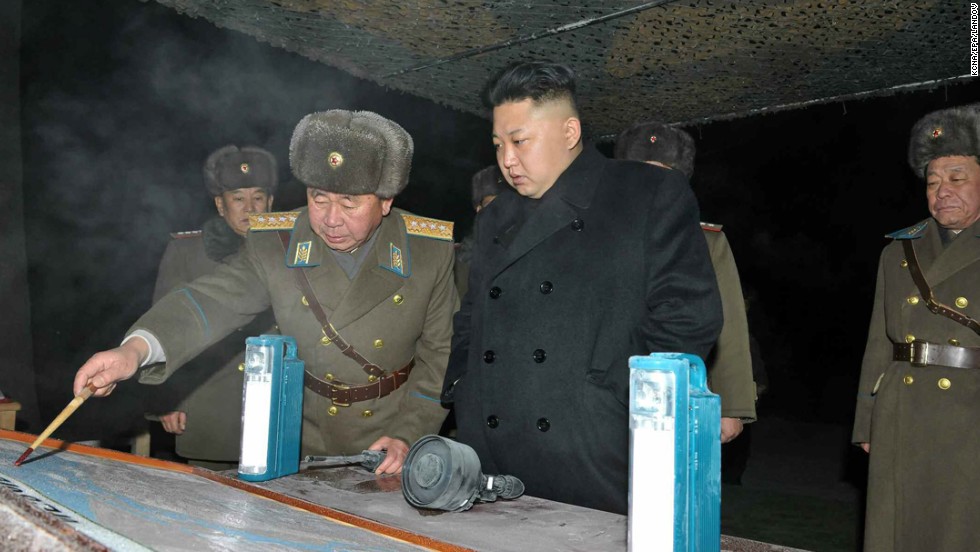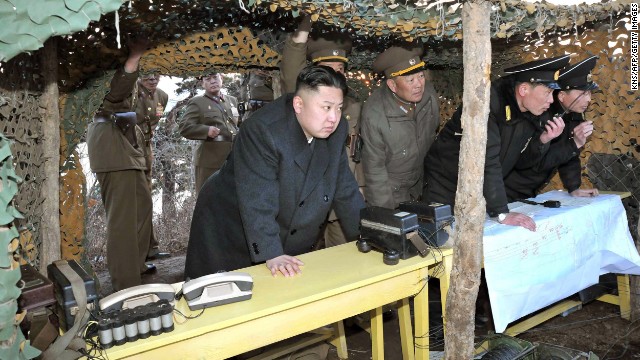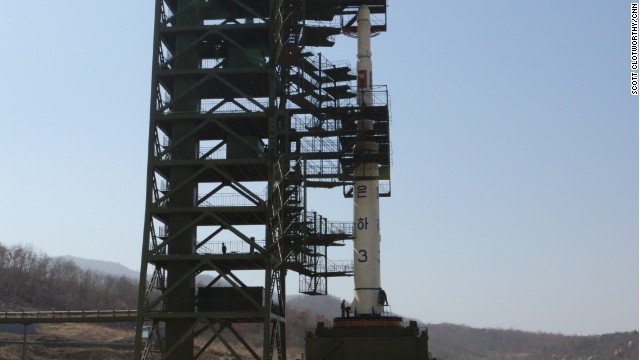Kim Jong Un and North Korea's military
North Korean leader Kim Jong Un meets with North Korea's first female fighter jet pilots in this undated photo released by the country's state media on Monday, June 22. He called the women "heroes of Korea" and "flowers of the sky."
Kim Jong Un and North Korea's military
Kim stands on the snow-covered top of Mount Paektu in North Korea in a photo taken by North Korean newspaper Rodong Sinmun on April 18 and released the next day by South Korean news agency Yonhap. Kim scaled the country's highest mountain, North Korean state-run media reported, arriving at the summit to tell soldiers that the hike provides mental energy more powerful than nuclear weapons.
Kim Jong Un and North Korea's military
Kim Jong Un, center, poses with soldiers on the snow-covered top of Mount Paektu in an April 18 photo released by South Korean news agency Yonhap.
Kim Jong Un and North Korea's military
Kim visits the Kumsusan Palace of the Sun in Pyongyang, North Korea, on April 15 to celebrate the 103rd birth anniversary of his grandfather, North Korean founder Kim Il Sung.
Kim Jong Un and North Korea's military
Kim inspects a drill for seizing an island at an undisclosed location in North Korea in an undated picture released by North Korea's official Korean Central News Agency on February 21.
Kim Jong Un and North Korea's military
Kim speaks during a meeting of the Political Bureau of the Central Committee of the Workers' Party of Korea in Pyongyang, North Korea, in this photo released February 19 by the state-run Korean Central News Agency.
Kim Jong Un and North Korea's military
Kim Jong Un and North Korea's military
Kim is seen walking with a cane in this image released Thursday, October 30, by the state-run Korean Central News Agency.
Kim Jong Un and North Korea's military
Kim sits in the pilot's seat of a fighter jet during the inspection.
Kim Jong Un and North Korea's military
This undated photo, released Tuesday, October 14, by the KCNA, shows Kim inspecting a housing complex in Pyongyang, North Korea. International speculation about Kim went into overdrive after he failed to attend events on Friday, October 10, the 65th anniversary of the Workers' Party. He hadn't been seen in public since he reportedly attended a concert with his wife on September 3.
Kim Jong Un and North Korea's military
A picture released by the KCNA shows Kim and his wife watching a performance by the Moranbong Band on Wednesday, September 3, in Pyongyang.
Kim Jong Un and North Korea's military
Kim tours a front-line military unit in this image released Wednesday, July 16, by the KCNA.
Kim Jong Un and North Korea's military
Kim poses for a photo as he oversees a tactical rocket-firing drill in June.
Kim Jong Un and North Korea's military
Kim watches a tactical rocket-firing drill in June.
Kim Jong Un and North Korea's military
A North Korean soldier patrols the bank of the Yalu River, which separates the North Korean town of Sinuiju from the Chinese border town of Dandong, on Saturday, April 26.
Kim Jong Un and North Korea's military
In this photo released Thursday, April 24, by the Korean Central News Agency, Kim smiles with female soldiers after inspecting a rocket-launching drill at an undisclosed location.
Kim Jong Un and North Korea's military
A picture released Tuesday, March 18, by the KCNA shows Kim attending a shooting practice at a military academy in Pyongyang.
Kim Jong Un and North Korea's military
A North Korean soldier uses binoculars on Thursday, February 6, to look at South Korea from the border village of Panmunjom, which has separated the two Koreas since the Korean War.
Kim Jong Un and North Korea's military
A North Korean soldier kicks a pole along the banks of the Yalu River on Tuesday, February 4.
Kim Jong Un and North Korea's military
A photo released by the KCNA on Thursday, January 23, shows the North Korean leader inspecting an army unit during a winter drill.
Kim Jong Un and North Korea's military
Kim inspects the command of an army unit in this undated photo released Sunday, January 12, by the KCNA.
Kim Jong Un and North Korea's military
Kim visits an army unit in this undated photo.
Kim Jong Un and North Korea's military
Kim inspects a military factory in this undated picture released by the KCNA in May 2013.
Kim Jong Un and North Korea's military
Kim visits the Ministry of People's Security in 2013 as part of the country's May Day celebrations.
Kim Jong Un and North Korea's military
A North Korean soldier, near Sinuiju, gestures to stop photographers from taking photos in April 2013.
Kim Jong Un and North Korea's military
North Korean soldiers patrol near the Yalu River in April 2013.
Kim Jong Un and North Korea's military
Kim is briefed by his generals in this undated photo. On the wall is a map titled "Plan for the strategic forces to target mainland U.S."
Kim Jong Un and North Korea's military
Kim works during a briefing in this undated photo.
Kim Jong Un and North Korea's military
In this KCNA photo, Kim inspects naval drills at an undisclosed location on North Korea's east coast in March 2013.
Kim Jong Un and North Korea's military
Kim, with North Korean soldiers, makes his way to an observation post in March 2013.
Kim Jong Un and North Korea's military
Kim uses a pair of binoculars to look south from the Jangjae Islet Defense Detachment, near South Korea's Taeyonphyong Island, in March 2013.
Kim Jong Un and North Korea's military
Kim is greeted by a soldier's family as he inspects the Jangjae Islet Defense Detachment in March 2013.
Kim Jong Un and North Korea's military
Kim is surrounded by soldiers during a visit to the Mu Islet Hero Defense Detachment, also near Taeyonphyong Island, in March 2013.
Kim Jong Un and North Korea's military
Kim arrives at Jangjae Islet by boat to meet with soldiers of the Jangjae Islet Defense Detachment in March 2013.
Kim Jong Un and North Korea's military
Soldiers in the North Korean army train at an undisclosed location in March 2013.
Kim Jong Un and North Korea's military
In a photo released by the official North Korean news agency in December 2012, Kim celebrates a rocket's launch with staff from the satellite control center in Pyongyang.
Kim Jong Un and North Korea's military
Kim, center, poses in this undated picture released by North Korea's official news agency in November 2012.
Kim Jong Un and North Korea's military
Kim visits the Rungna People's Pleasure Ground, under construction in Pyongyang, in a photo released in July 2012 by the KCNA.
Kim Jong Un and North Korea's military
A crowd watches as statues of North Korean founder Kim Il Sung and his son Kim Jong Il are unveiled during a ceremony in Pyongyang in April 2012.
Kim Jong Un and North Korea's military
A North Korean soldier stands guard in front of an UNHA III rocket at the Tangachai-ri Space Center in April 2012.
Kim Jong Un and North Korea's military
In April 2012, Pyongyang launched a long-range rocket that broke apart and fell into the sea. Here, the UNHA III rocket is pictured on its launch pad in Tang Chung Ri, North Korea.
Kim Jong Un and North Korea's military
– A closer look at the UNHA III rocket on its launch pad in Tang Chung Ri, North Korea.
Kim Jong Un and North Korea's military
A military vehicle participates in a parade in Pyongyang in April 2012.
Kim Jong Un and North Korea's military
North Korean soldiers relax at the end of an official ceremony attended by leader Kim Jong Un at a stadium in Pyongyang in April 2012.
Kim Jong Un and North Korea's military
Kim Jong Un applauds as he watches a military parade in Pyongyang in April 2012.
Kim Jong Un and North Korea's military
A North Korean soldier stands on a balcony in Pyongyang in April 2012.
Kim Jong Un and North Korea's military
North Korean soldiers march during a military parade in Pyongyang in April 2012.
Kim Jong Un and North Korea's military
Soldiers board a bus outside a theater in Pyongyang in April 2012.
Kim Jong Un and North Korea's military
North Korean performers sit below a screen showing images of leader Kim Jong Un in Pyongyang in April 2012.
Kim Jong Un and North Korea's military
North Korean soldiers salute during a military parade in Pyongyang in April 2012.
Kim Jong Un and North Korea's military
North Korean soldiers listen to a speech during an official ceremony attended by leader Kim Jong Un at a stadium in Pyongyang in April 2012.
Kim Jong Un and North Korea's military
Members of a North Korean military band gather following an official ceremony at the Kim Il Sung stadium in Pyongyang in April 2012.
Kim Jong Un and North Korea's military
North Korean military personnel watch a performance in Pyongyang in April 2012.
Kim Jong Un and North Korea's military
A North Korean controller is seen along the railway line between the Pyongyang and North Pyongan provinces in April 2012.
Kim Jong Un and North Korea's military
A North Korean military honor guard stands at attention at Pyongyang's airport in May 2001.























































































































